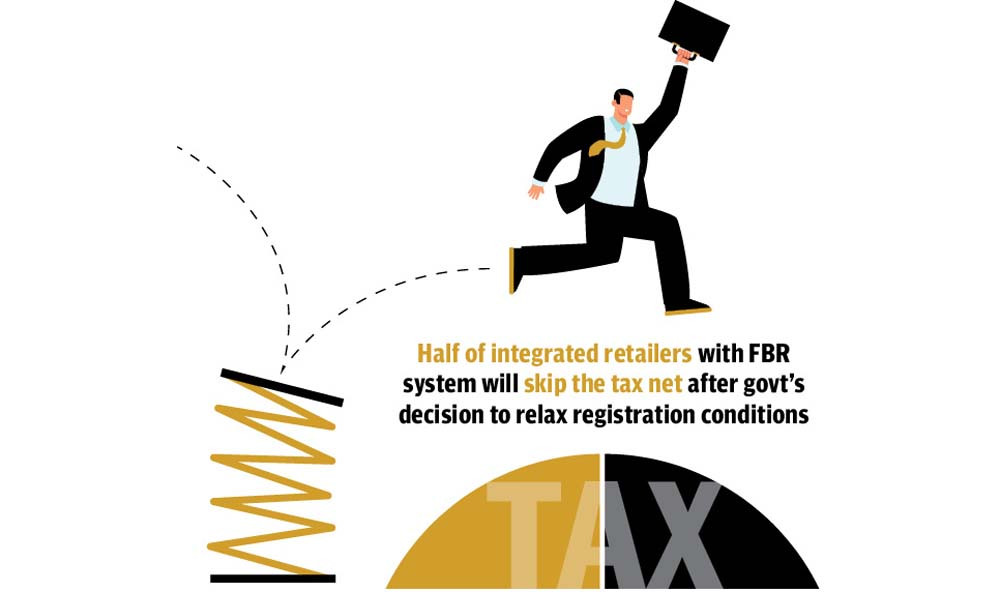
Over half of the integrated 9,082 big retailers will exit the Federal Board of Revenue (FBR) system due to the omission of one registration condition from the law by the government. This omission will further erode the tax base of Pakistan.
In an effort to support retailers, the Pakistan Muslim League-Nawaz (PML-N)-led coalition government has deleted an important condition for integrating large retailers with the FBR’s system through the Finance Act 2023. However, the government has simultaneously burdened the salaried class with the collection of additional revenues.
Highly placed sources within the FBR told The Express Tribune that approximately 4,800 big retailers will benefit from the recent legal change in the General Sales Tax Act, as approved in the budget. This means that nearly 53% of the 9,082 big retailers registered with the FBR will no longer be required to file their monthly sales tax return statements.
The tier-1 retailers are those who work in large shopping malls, use debt or credit card machines, are already linked to the formal economy in some way, and are easily trackable within the tax system.
The government’s Point of Sale (POS) registration initiative has already faced challenges. Despite years of efforts, including offering prize money and collecting Rs1 per invoice from customers to strengthen systems, only 9,082 retailers could be integrated with the FBR. It is possible for one retailer to have multiple machines linked to the FBR’s data system.
One of the conditions for tier-I retailers is that they should operate as a unit of a national or international chain of stores, operate in an air-conditioned shopping mall, have a cumulative electricity bill of over Rs1.2 million in the past year, and engage in the bulk import and supply of consumer goods on a wholesale basis to retailers.
However, the requirement for registration has been removed for general retailers with shops measuring 1000 square feet, furniture retailers with shops measuring 2000 square feet or more, and jewellers with shops measuring 300 square feet. According to sources, around 4,800 retailers were registered under the square footage clause.
Pakistan has faced repeated criticism for its narrow tax base and a tax system that favours a few classes.
International Monetary Fund (IMF), Managing Director, Kristalina Georgieva, stated on Wednesday that there is a need for enhanced efforts to expand the tax base, improve public financial management, and increase progressivity and efficiency in delivering quality infrastructure.
However, Pakistan has taken actions contrary to what is needed, such as providing relief to retailers, which would not be beneficial for the country. Last year, the government also withdrew the nominal Rs3000 per month tax on retailers.
Georgieva also emphasised that improving tax revenues is critical to strengthen public finances and create fiscal space for increased social and development spending. She issued this statement following the approval of the $3 billion Stand-By Arrangement by the board.
To retain some of the retailers, the FBR will have to check whether these beneficiaries meet any of the other conditions. Sources indicate that the FBR wanted to include a clause in the law that would prevent already registered retailers from benefiting from the legal amendment. However, the government did not accept the FBR’s proposal.
When contacted, FBR spokesman Afaq Qureshi stated that as of June 30th, a total of 9,082 tier-1 retailers are integrated with the FBR’s POS system. He clarified that it would be incorrect to claim that over 50% of the tier-1 retailers were integrated solely based on the size of their shops. These tier-1 retailers generally meet multiple criteria, such as being part of a national or international chain of stores, having annual electricity bills of Rs1.2 million or more, having installed banking POS systems, or having income tax deductions under section 236G or 236H, he said.

design: Ibrahim Yahya
However, he did not officially provide a specific number of retailers who would benefit from the clause.
The FBR’s field formations are supposedly vigilantly monitoring the situation on the ground, according to the spokesman. He stated that as of now, no tier-1 retailer has been disintegrated by the FBR.
Contrary to this claim, sources indicate that there has been no vigilant monitoring on the ground. They added that around 4,800 retailers would no longer be required to submit their returns from July onwards, as their registration base ended after the amendment in the Act.
During budget proceedings, the Senate Standing Committee on Finance repeatedly asked the FBR chairman about the number of retailers benefiting from the change in the law. However, the chairman never fully disclosed this information to the committee.
When questioned about the justification for the FBR to collect Rs1 per invoice from customers in the name of POS integration when only around 4,300 retailers will be integrated with the FBR, Qureshi stated that the deletion of any sub-clause of section 2(43A) does not affect the POS fee.
According to Qureshi, the Re1 POS fee is collected as per the law from retailers integrated with the FBR’s POS system. Therefore, there is no connection between the Re1 POS fee and the recent changes in the law.
In the past, the FBR attempted to divert the millions of rupees collected through the Rs1 fee towards providing personal benefits to its employees.
Published in The Express Tribune, July 14th, 2023.
Like Business on Facebook, follow @TribuneBiz on Twitter to stay informed and join in the conversation.


1732184775-0/BeFunky-collage-(80)1732184775-0-165x106.webp)

1731933289-0/BeFunky-collage-(68)1731933289-0-165x106.webp)













COMMENTS
Comments are moderated and generally will be posted if they are on-topic and not abusive.
For more information, please see our Comments FAQ